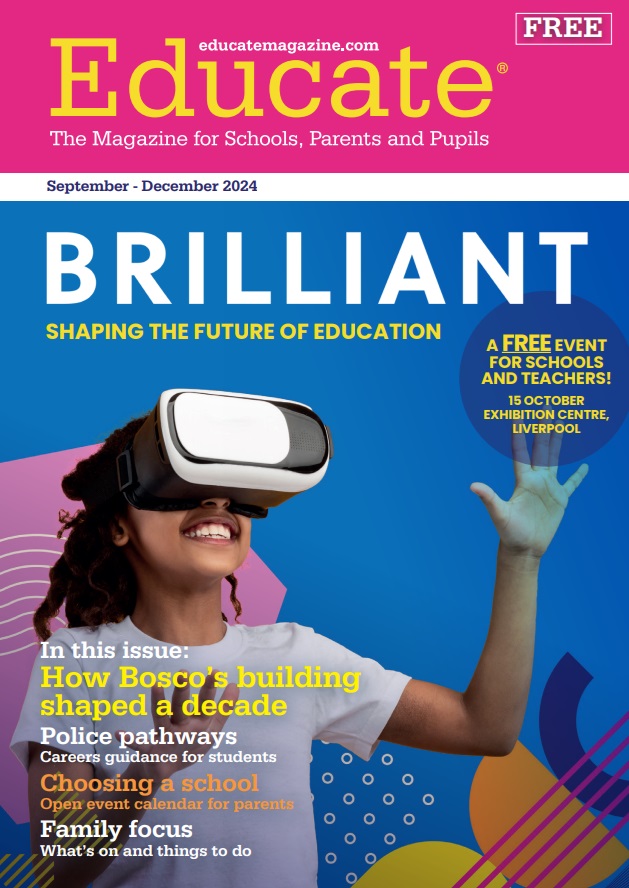How to make your entry unforgettable

With the deadline for entries fast approaching and the fourth annual Educate Awards only months away, we caught up with the judging panel to give you some handy tips when filling out that all important entry form.
The third annual Educate Awards took place in Liverpool Cathedral last November as schools across the Liverpool City Region joined together to celebrate the very best in education. This year will mark its fourth year, and will again celebrate the passionate teachers and the innovative and creative projects that take place throughout the region.
The Educate Awards 2015 already looks set to surpass last year, as the awards will now accept entries from schools and colleges in the boroughs of Lancashire and Cheshire. With this expansion comes three, brand new award categories for 2015. These are the Leadership Team of the Year, Outstanding Teaching of Life Skills and Innovation in Education awards.
With a growing panel of experts and education champions judging the awards, making sure your entry impresses is vital to taking home one of the prestigious accolades. Joining the panel for 2015 is Olympian and managing director of leadership and development company Raise the Bar, Steve Smith. Having worked with some of the leading businesses in the country, he hopes to bring his unique business insight to this year’s panel.
Another new addition to the panel is Leanne Campbell, trained actress and Radio City’s first female breakfast show host. As well as a glittering career in showbiz over the years, Leanne is a qualified teacher and has taught in many primary and secondary schools, youth offending units and colleges across the North West.
Lastly, joining the panel this year is footballing legend Robbie Fowler. This year Robbie will open the Fowler Education Football Academy (FEFA) on Merseyside, a college with a focus on the best of both worlds; a great academic and football education. His partnership with the awards demonstrates his passion for developing and recognising this region’s talent.
Returning once again are Councillor Gary Millar, Liverpool’s cabinet member for business, enterprise and investment; Chris Walker, regional managing editor of Trinity Mirror North West and North Wales; Lesley Martin-Wright, chief executive of Knowsley Chamber; Mark Beedles, managing director of Connex Education; Fiona Barnet, director of The Foundry Agency; Andrew Pimbley of Claremont Farm and Wirral’s Farm Feast; and the education team at the respected Everyman and Playhouse Theatres.
Before the stunning awards ceremony can take place at Liverpool Cathedral on 20 November, the vitally important award entries have to be submitted, reviewed and evaluated. The preparation for your awards entry is just as important as the night itself.
There are number of points to consider when planning and completing your entry. We caught up with the judges to find out what they will be looking for this year, their handy tips to those submitting an entry and what the successful components of an award-winning submission comprise of.
CHOOSE WISELY
“Understand and pick the correct category you are entering”, says Andrew Pimbley. It sounds simple enough, but choosing the right category to shine a spotlight on your school is an important element of the application which should not be overlooked. Lesley Martin-Wright reiterates this point further, saying: “Don’t enter the same application for different award categories. Use this as an opportunity to be recognised for your school’s
successes, ambition, effort or aspiration.”
The Educate Awards now has 19 categories covering a diverse range of subjects; each award reflects the educational curriculum and the different extra-curricular opportunities available to students. This includes Outstanding Commitment to Sport, Innovative and Creative Literacy Award, Outstanding Arts, Eco Project of the Year and Career Aspiration Award.
Choosing the right category for your project may take time, but it will pay off and ensure your inspiring project gets the recognition it deserves.
KEEP TO THE BRIEF
Each award has key criteria which the judges will be looking for; whether it’s demonstrating what your school has done to improve student’s interest in sports or showing your creative and innovative approaches to guiding pupils towards future careers, following the entry instructions is fundamental to your entry success. The Foundry Agency’s Fiona Barnet sees this aspect of the entries as of utmost importance. “Keep your entry to the point and answer the criteria specifically, this will improve your chances of a successful entry,” she says. Gary Millar, returning for a second year as a judge thinks “keeping to the brief” is the best advice to help make it to the shortlist.
LESS IS MORE
A word document supporting your submission is allowed within the entry guidelines, with 750 words maximum. This word limit gives every applicant the same opportunity to tell the judges why they should win, and as the judges point out, long-winded entries don’t necessarily mean better ones. “Don’t be shy about banging the drum for your school,” says Chris Walker, “but be succinct in telling us why it should win an award.”
Emma Whitley, education manager at the Everyman and Playhouse, says: “Be clear and concise when describing your entry, and illustrate it as much as you can – And to grab Gary Millar’s attention? ‘Short and punchier pitches’ are what he is looking for this year.
Although it is Steve Smith’s first year as a judge, he will be looking for nothing but the best; he is eager to see simple but effective entries that “demonstrate a collaborative approach in all departments”, but he adds: “Keep it short and sweet. I’m looking for real clarity in the entries.”
EVIDENCE YOUR RESULTS
As a school or college, when you work on a project from inception to completion, you are immersed in that task and know every detail, intention and outcome about why your project is one which is award worthy. But for our judges, the entry pack they receive will be the first introduction to your eco or science project, community partnership collaboration or how you communicate as a school. “It’s important to remember we have not been involved,” says Emma Whitely, “So you have to be very clear when trying to get the impact and story of your project across.”
Try and think about your entry objectively, and examine whether it truly explains and provides evidence to support the statements made in the submission. For all of the judges, evidence is crucial to a fruitful entry. “I am a huge believer in the positive learning we can achieve through the arts,” says new judge Leanne Campbell. “I’m hoping to see heart-warming evidence of how powerful arts teaching can be used in a school environment.”
For the Teacher of the Year award, evidencing how a teacher has gone above and beyond for a pupil or class is especially important, says Lesley Martin-Wright. “For those nominated in the individual categories, and who have great responsibilities to children, parents and families, I will be looking for information on how this person has influenced lives or positive outcomes,” she says.
Mark Beedles echoes Lesley’s views, saying: “Working in the education sector, you hear so many stories about the pressures schools and teachers are always under, so to see schools and teachers going above and beyond for the sake of the children always inspires me.” Mark’s advice for applicants for 2015? “Keep doing what you have been doing the last three years,” he says. “Judging the awards is my favourite time of year.”
DON’T BE AFRAID OF THE NEW
When entering a new category, it can be hard to predict what the judges will be looking for, especially as there are no past winners to benchmark your entry against. The Leadership Team of the Year award will be awarded to an outstanding team – involving the head teacher, deputy as well as other senior leadership staff who can demonstrate how their leadership has resulted in key successes within the school. “I want to see examples of schools that have created a culture of value, and teams that can delegate and create autonomy in their decisions,” explains Steve Smith. He adds: “I want to see a leadership team that involved everybody in their journey and fostered a real sense of belonging in the school.”
For the Innovation in Education award, your entry should try and answer one important question: How is your school transforming the way students learn with a creative, innovative and pioneering – technology or non-technology based – approach? To excel in this category, distinction from the rest is paramount. Fiona Barnet says: “I will be looking for entries that demonstrate the school has done something really different to enhance the learning of its pupils.”
The final new category, Outstanding Teaching of Life Skills covers a broad spectrum of projects and activities. While there is no definitive list, indicating how your school has equipped students with relevant life skills such as money management, food knowledge, mental wellbeing and character building will all be well received. For Andrew Pimbley, schools that are “pushing the boundaries of the ‘normal’ education system” will stand out.
STRENGTHEN YOUR ENTRY
Providing supporting materials in your entry is the best way to overcome that tricky word limit. “Testimonials from children and young people” are a great way to add value to your application says Gary Millar, or perhaps “do a one minute video pitch‚” if you want to show off your school’s creativity. Even something simple can transform an entry, as Emma Whitley suggests: “Quotes and thoughts from those involved always help bring it to life.”
Adding visual elements to your entry can also help, says Fiona Barnet. “Photographic evidence will really add to your submission and make it compelling to read,” she says. Including snapshots of your project or progress photos from an exciting school initiative can lift an entry and make your submission stand out amongst the rest.
BE UNFORGETTABLE!
Lastly and perhaps most importantly is to make your award entry memorable. “I will be looking for something different, true ‘thinking outside the box’ to make me sit up and go WOW!” says Andrew Pimbley.
For Emma Whitley, originality is vital, as she explains entries which will impress her will have “new and innovative ideas. Something I haven’t seen before.” Applications that have stood out for Lesley Martin-Wright over the years have been “full of energy and enthusiasm” and have “demonstrated a significant – and perhaps an unexpected successful outcome, innovation, benefit or advantage.”
In the changing landscape of education, it seems innovation is at the top of the judges’ lists for 2015. Passionate, inspirational and engaging are just some of the key words associated with memorable entries and the judges are hoping to find even more impressive projects for 2015. Mark Beedles says:”As always I am looking for entries that truly inspire young minds.”
AND FINALLY…
If you have any doubts about whether to get involved in The Educate Awards, Lesley Martin-Wright urges you to enter, she says: “Do submit an application. This is one of the most empowering awards I have been involved in. Every word and every sentence conveys the importance and significance of our teaching profession – their passion, commitment and dedication to educate and inspire is simply overwhelming.”
Entries are now open. Closing date for entries is Friday 10 July 2015. For a full list of award categories and more details on how to enter, go to: www.educateawards.co.uk



